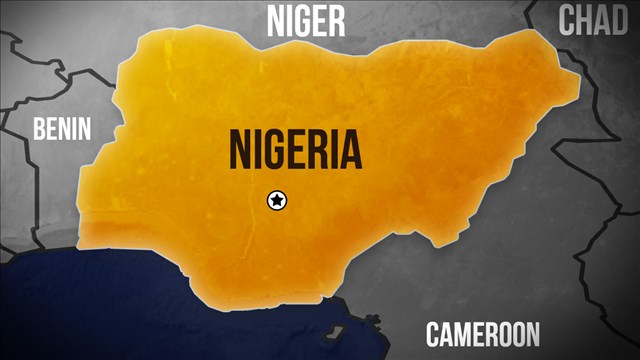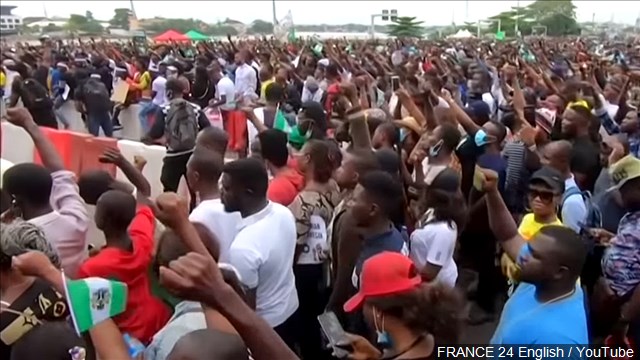What may be worse than law enforcement officers in U.S. cities receiving police training in Israel? Nigeria’s recently disbanded notorious Special Anti-Robbery Squad or SARS receiving police training from the United Kingdom College of Policing. According to the African program director for the International Crisis Group, Dr. Comfort Ero, “We should acknowledge that SARS was part of the UK government’s own conflict stability and security sector police programming.”

On October 30 the UK-based Independent reported that “a freedom of Information (FoI) request has revealed that the College of Policing— the professional body for police in England and Wales—had worked with the Nigerian authorities to train its security officers during 2019.”
In addition, reported the Independent, the UK had “given training and support to Nigerian security forces condemned for their brutal crackdown against protestors in recent weeks.”
Labor MP Kate Osamor weighing in demanded Prime Minister Boris Johnson’s government reveal “whether there are any British ties to Nigeria’s notorious police unit” and said it raised fresh questions about Nigeria’s former colonial master’s involvement in the country.
Recently during an International Crisis Group live audio broadcast that included the Nairobi-based Dr. Ero and ICG’s senior advisor on Nigeria, based in Abuja, Nnamdi Obasi, the two focused on Nigeria.

“Nigeria is the biggest country demographically in Africa. It’s about a quarter of the African continent. It’s Africa’s second largest economy behind South Africa. It’s also a major player in continent wide politics,” Obasi said, while opening the segment of the program focusing on the West African country. Continuing to show Nigeria’s relevancy and influence to the rest of the continent, including the African Union (AU), he said, Nigeria was a major player in regional geo-politics as a member of the Economic Community of West African States (ECOWAS) and has played a major role in peacekeeping operations in various countries on the continent.
On top of that, Nigeria has been at the forefront of the movement to make the continent, or at least one of its 54 countries, a permanent member of the United Nations Security Council.
Opening the SARS discussion, Obasia said, “The special unit of the police (named) SARS has been in existence since 1992, but over time performed very poorly. It has been accused by human rights organizations of numerous abuses, cases of corruption, extrajudicial killings, corruption etc.”
Obasia was also former head of the Department of Peacekeeping and Humanitarian Affairs at the Center for Strategic Studies and Research. “Since 2017, there was a movement that was building called the ‘EndSARS’ movement,” he explained. Obasia said, the movement called “for disbandment of SARS, but expanded to include wider police reforms.” In addition, the call for police reforms “were seen as a symptom of wider failure of government.”
Obasia believes the protest movement in part was because students were out of school.
“Part of the reason why it’s that way is because many of the universities across the country were shut down since February because of (a) labor dispute against government and (the) academic staff union of universities. So the thousands and hundreds of thousands of students who should be in school have been home since February is part of the discontent and have been able to join the protest.”
In terms of locations of protests, Obasia said, “Geographically it’s more concentrated in the South of the country, rather than the North. Also, because police (are) more abusive in large cities in the South like Lagos and Warri and elsewhere.” The North has its own different security issues, like dealing with Boka Haram and banditry, so protests are not as enthusiastic as in North as in South concerning banning (the) SARS unit, explained Obasia. “Most people in North felt that SARS should be more empowered to deal with the issue.”
Obasia said the “violence (which has quieted down) on warehouses with relief packages (that were) intended for Covid-19 lockdowns had been kept for several months and people were outraged as to why government was stockpiling these staples while people were in need.” There is so much hunger in Nigeria and so many people were in support of breaking into warehouses, but it got out of hand and grew to about 25 police stations being completely destroyed, and two officers killed, he explained.
“Jails (were) broken into and 2,000 prisoners fled. Criminals that were on trial were set free, even records of court proceedings no longer available to prosecute criminals,” Obasia continued. “Things got so out of hand that police withdrew from streets.” There was fear of police being lynched by mobs if they redeployed.
Dr. Ero, who has a Ph.D. from the London School of Economics, University of London, chimed in saying, “It’s not just responding to the youth demands, it’s also about dealing with bad reality of Nigeria, which has a really demoralized police, who have taken a beating, not just in relation to this crisis, but also in the North East.”
She continued, “A lot of the (police) barracks were targeted during Boka Haram insurgency and now … demoralized, underpaid police (are) targeted. You see not just in Lagos but in other states (Nigeria has 36 states) right across we saw violence in Delta and right across the South, South West and South East.”
Dr. Ero highlighted the attacks on key government installations—against the high court, key properties owned by specific politicians. These attacks, she explained, show the (level of) frustration against the political class of Nigeria. “These are indications of deep undercurrents here, way beyond just the police, but against the political class,” she added.
An example is when Nigerian President Muhammadu Bahari recently spoke to the nation concerning the unrest that has gripped the country. He did so without any mention of the shootings of peaceful protestors at the Lekki toll plaza that ignited international outrage.
According to Amnesty International, the military opened fire without any provocation or warning thousands of peaceful demonstrators while they sang the national anthem and waved the country’s flag, killing at least 12 and injuring many more.
Obasi said he wasn’t just referencing the Buhari administration, its failure but government on all levels, even the local level. The “corruption has produced a very deep sense of discontent,” he explained.
That is corruption of the political elite, wide disparities, growing poverty, and rising unemployment. This has been aggravated by the Covid-19 pandemic that has diminished the Nigeria’s revenue largely from oil. But also, the depleted agricultural sector in the North. These factors have resulted in increased inflation. In October the country experienced the highest inflation rate in 30 months, Obasi explained.
“Unemployment, inflation, bad government, deepening poverty and apparent aloofness of the political class, not just failure to engage with the issues and continuous deficit between people and government and all of this came together and exploded in this protest.”
Follow @JehronMuhammad on Twitter.













